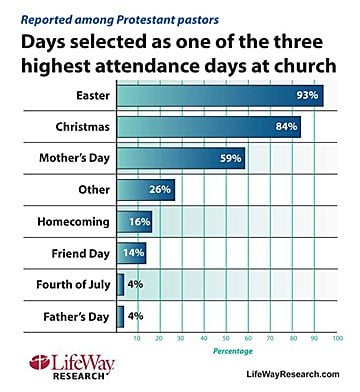The good news: Mother’s Day is a big church attendance day, ranking in the top three (along with Christmas and Easter).
The bad news: Father’s Day is a low attendance day, ranking at the bottom of the churchgoing chart.
 This news, both good and bad, comes from a recent survey conducted by LifeWay Research. Lifeway asked 1,000 Protestant pastors which special days of the year brought the most people to church. No surprise that Easter and Christmas took the top spots. But Mother’s Day came in number three.
This news, both good and bad, comes from a recent survey conducted by LifeWay Research. Lifeway asked 1,000 Protestant pastors which special days of the year brought the most people to church. No surprise that Easter and Christmas took the top spots. But Mother’s Day came in number three.
Why is Mother’s Day such a popular churchgoing day? Scott McConnell, director of LifeWay Research, observes that “mothers want to be present for the affirmation that is typically offered in most churches, but families also are present knowing their attendance will honor their mother. Many families make church attendance on Mother’s Day nearly obligatory.”
McConnell may be right, but I think he misses a major factor: mothers want to go to church with their families, especially their children, on Mother’s Day. Actually, most Christian mothers would like to go to church with their families every Sunday. But on Mother’s Day they have extra clout, even among family members who would rather skip church.
But what about Father’s Day? Why doesn’t it draw the crowds to church? McConnell weighs in on this: “The attendance difference between Mother’s Day and Father’s Day is telling. . . . Either churches are less effective in affirming fathers, or families believe Christian fathers don’t value their participation in worship services.” What McConnell fails to state is that families might believe fathers don’t value their participation in worship services because, in fact, many fathers don’t value going to church.
In a USA Today article, Ed Stetzer, president of LifeWay, puts it more bluntly: “It seems that on Mother’s Day, moms say, ‘Let’s all go to church.’ But on Father’s Day, dads say, ‘I’m going to go play golf.'” I expect Stetzer is on to something here.
David Murrow, author of Why Men Hate Going to Church, believes that churches are to blame for the tendency among fathers to skip worship on their special day. According to Murrow, on Mother’s Day “pastors tend to gush over women in their sermons. . . . But on Father’s Day, men get a ‘straighten up’ lecture: ‘Dad, get right with God, reconcile with your kids,’ etc.” I’m not sure Murrow is always right. But, to the extent that he is, I have an explanation. Pastors are blasting away at fathers because they are guilty about their own failures as fathers. They are saying to the fathers in the pews what they need to say to themselves.
Nevertheless, I fear that the main reason Mother’s Day is a big church attendance day and Father’s Day lags behind has to do with far more than what happens on these two special Sundays. In general, men are much less involved in church than women, fathers much less than mothers. Given the high correlation between churchgoing fathers and children who end up as faithful disciples of Jesus, this should be a major concern. I’m not suggesting that we all start pummeling fathers who don’t go to church regularly. But I am suggesting that we need to give this some serious thought. David Murrow, in Why Men Hate Going to Church, has some ideas about this. I wonder what you think. Why are men less inclined to attend worship services? Why is this true even among men who are believing Christians?











